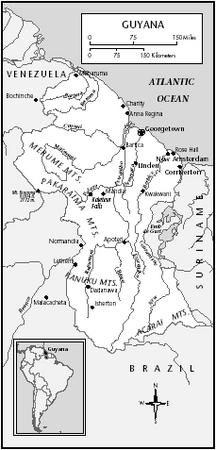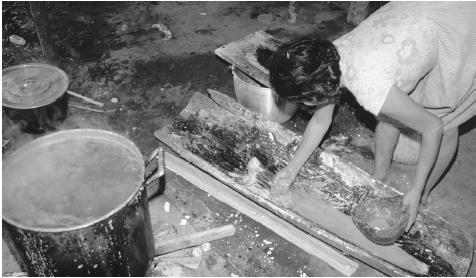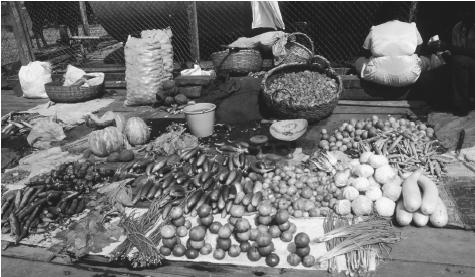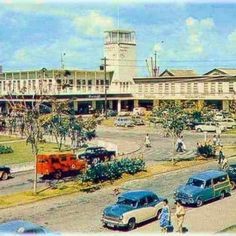West Indies Cricket Fans Forum
Guyana is an Amerindian word meaning "the land of many waters."
Culture Name
Guyanese
Orientation
Identification. Guyana is an Amerindian word meaning "the land of many waters." Attempts to forge a common identity have foundered, and it is more accurate to speak of African, Indian, and Amerindian Guyanese cultures. There were small European, Portuguese "colored," and Chinese communities before large-scale migration to Canada and the United States in the late 1960s. British Guiana was referred to as "the land of six peoples."
Location and Geography. Guyana is on the northeastern shoulder of South America, bounded on the north by the Atlantic Ocean, on the east by Suriname, on the northwest by Venezuela, and on the south and southwest by Brazil. The capital city is Georgetown. In an area of 83,000 square miles (212,000 square kilometers), there are three regions: the narrow coastal belt of rich alluvium; the densely forested, hilly sand and clay belt; and the Rupununi grasslands between the rain forests and the frontier with Brazil. Over 90 percent of the population lives on the coastal belt, which is below sea level. The Dutch, using African slaves in the eighteenth century, made this area habitable. Every square mile of cultivated land has forty-nine miles of drainage canals and ditches and sixteen miles of high-level waterways.
Demography. The population was 758,619 in 1980. It had declined to 723,800 in 1991, and an estimated 720,700 in 1996. In 1991, the population consisted of 49 percent Indians; 35 percent Africans; 7 percent mixed race peoples; and 6.8 percent Amerindians. Indians are of the following religions: Hindu, 65 percent; Muslim, 20 percent; and Christian, 15 percent. Massive migration has led to the virtual disappearance of Chinese, mixed, Europeans, and Portuguese.
Linguistic Affiliation. The official language is English. No African languages survived slavery, nor have those of the indentured laborers (Indians, Madeiran Portuguese, and Chinese). Guyanese speak creole dialects of English with varying ethnic lexical imprints. However, all dialects are mutually intelligible.
Symbolism. There are few national symbols or metaphors. The national hero, Cuffy, the leader of the Berbice Slave Rebellion in 1763, is primarily an African Guyanese hero whose statue in Georgetown evokes Indian antipathy. Indians tend to identify with an India of the imagination and the Hindu and Muslim religions. Africans often look to an imagined Africa. The utopian vision of Guyana—El Dorado—created by Sir Walter Raleigh in the 1590s, claims the imagination of most Guyanese today.
History and Ethnic Relations
National Identity. The colonial rulers promoted images of Britishness to inculcate loyalty to the empire, but although various ethnic groups absorbed aspects of that culture, they retained their identities. The Portuguese attempted to selectively Anglicize their Madeiran Catholic culture to stress their European-ness. Most Africans adapted British culture to an essentially African core. Indians, coming after the Africans (between 1838 and 1917), sustained a stronger sense of their national identity. This process of "creolization" affected all groups but did not forge a national culture.
Ethnic Relations. After adopting British cultural idioms, the African and mixed middle class deprecated the "backward coolie" culture of Indians. The Indians, steeped in ancient notions of caste, brought rigid ideals of color and physical features to their judgment of African people, although most Indian immigrants were themselves dark. Africans and Indians thus constructed distinct

Urbanism, Architecture, and the Use of Space
The two main commercial centers are Georgetown and New Amsterdam. The colonial architecture found in parts of Georgetown is still impressive wooden buildings with jalousies and high ceilings to facilitate ventilation, some featuring large, wooden verandas. In rural areas, there are many wooden buildings made up of many eclectic styles, but all are built on stilts to protect them from floods. Wooden buildings are fading into the past, however, as concrete buildings are becoming more common.
Food and Economy
Food in Daily Life. Basic foods reflect ethnic preferences, but there has been considerable cross-fertilization. The creole foods created by Africans have been adopted by all the other groups. Dishes made from "ground provisions" now constitute a national menu: crab or fish soups with plantains, eddoes, cassava, dasheen, and coconut milk; "cook-up rice" with black-eyed peas, pigs tail, green plantain, and cassareep; and Indian curries and roti.
Food Customs at Ceremonial Occasions. At African festivals and life cycle rites, creole foods are served. Vegetarian curries are provided at Hindu weddings; the day after a wedding, curried meat is served.
Basic Economy. Most food is produced locally, including rice, fruits and vegetables, sugar, cooking oils, fish and seafood, meat, and rum. Colonial tastes survive in the form of sardines, corned beef and mutton, chocolate, and whiskey. Imports largely consist of fuels and lubricants, cars, agricultural machinery, clothing and footwear, and consumer durables.
Commercial Activities. In a primarily agricultural country, the main exports are sugar and rum. Rice is grown primarily on small farms, and coconuts also are an important crop. The major industrial products are bauxite, gold, and lumber. Fishing is established, as is livestock rearing. Tourism, mainly to the wild interior, is in its infancy.
Major Industries. Industry is still in its infancy in Guyana. The one exception to this are the companies that process bauxite and the facilities in rural areas set up to dredge for gold.
Trade. Guyana trades primarily with the European Union (mainly the United Kingdom), Canada, the United States, and the Caribbean community. Most of the country's main export, sugar, is sold to the European Union. The bulk of rice production goes to the Caribbean, and bauxite is exported to Canada and the United States.
Division of Labor. Eighty percent of workers in the sugar industry and 90 percent of rice farmers are Indian, as are many growers of fruits and vegetables and forestry and fishing workers. Africans tend to go into the professions, work in public service, and seek employment as skilled workers in urban centers and the interior.
Social Stratification
Classes and Castes. There are class differences within each ethnic group. One can identify an Indian middle class based primarily in commerce and an African middle class in the professions and the upper echelons of public service. Middle class consciousness across ethnic lines is weak, and includes very few Amerindians. Between 1988 and 1996, gross domestic product increased by forty percent, with remarkable growth in sectors where Indians are disproportionately represented. The public sector, where Africans dominate, experienced no growth in that period.
Symbols of Social Stratification. Markers that locate people as middle class regardless of ethnicity include place of residence, the employment of security guards, the type of car driven, the type of English spoken, the frequency of travel overseas, where and what the men drink, where the women shop, clubs, and access to private tutors for children.
Political Life
Government. The 1992 and 1997 general elections were won by the predominantly Indian People's Progressive Party (PPP). The elections of 1968, 1973, 1980, and 1985 and the referendum of 1978 were widely seen to be rigged in favor of the predominantly African People's National Congress (PNC), which ruled from 1964 to 1992. The electoral system has been one of proportional representation since 1964. Fifty-three seats in the national Parliament are allocated proportionally. Another tier of government serves the ten regions; the President, who is the leader of the victorious party, heads the government but does not sit in Parliament.
Leadership and Political Officials. Elections are a demonstration of ethnic strength rather than a reflection of popular will. Cheddi Jagan and L. F. S. Burnham were the cofounders of the PPP, a loose coalition of the two main ethnic groups. The first PPP government, elected in April 1953, was thrown out by the British for fear of communism. Party rivalries since that time have involved different versions of Marxism, and the various parties have failed to deal with racial antagonism.
Military Activity. Before the 1990s, the army was crucial to the projection of political power, and was a source of employment for African youths. In 1992, the Guyana Defence Force was 97 percent African and 3 percent Amerindian, with Indians accounting for less than one percent.
Gender Roles and Statuses
Division of Labor by Gender. The economic and political spheres are dominated by men, but a few women are senior officials in the government. Although there has been one female president, there is a paucity of women in the cabinet, the legislature, and the leadership of political parties. Women play a significant role as farmers, market vendors, teachers, nurses, civil servants, and clerks, as well as doing housework. In recent years girls have outperformed boys in regional examinations, and more women than men attend university.
The Relative Status of Women and Men. The abandonment of children by fathers and a culture of male-centered drinking frequently leave women with the sole responsibility for their children. In urban areas, where the extended family is often nonexistent, many African women are the family breadwinners. The state provides virtually no social welfare assistance.
Marriage, Family, and Kinship
Marriage. Among Hindus and Muslims, arranged, comparatively early marriages are common. Middle-class Indians have greater freedom in choosing a spouse, especially if the woman is a professional. Marriage usually occurs later, and the family is smaller. Indian families are patriarchal and often function as corporate economic units. Formal marriage is less common among the African working class, and the middle classes marry later.
Domestic Unit. There is a high incidence of multi-generational women-centered households in working-class families. Younger men may belong to and contribute to the household, and older men may join later. Men usually marry late and often engage

Socialization
Infant Care. Among all the ethnic groups, the extended family plays a role in the socialization of children. In an outdoor society, children are allowed to roam. In rural communities, discipline is a communal responsibility. Children and younger adults address elders not by their names but as "auntie" or "uncle." Children usually are carried by parents, siblings, and relatives.
Child Rearing and Education. Teaching children "correct" behavior is a priority. Corporal punishment is considered indispensable, and attendance at church, temple, or mosque is used to inculcate moral values. Life cycle rites and rituals are central to the shaping of a child.
Higher Education. Mixed people and Africans were pioneers in education. Until the 1930s, Indians tended to resist educating girls, but the example of other groups and the emergence of an Indian middle class have led to a changed attitude. Until decolonization in the late 1960s, secondary schools were excellent. The University of Guyana, founded in 1963, has produced many distinguished scholars and professionals, but it has also suffered from the mass exodus of Guyanese academics.
Religion
Religious beliefs. African, Amerindian, and Indian traditional cultures have sustained folk practices that have penetrated Christianity, Hinduism, and Islam. Obeah has its roots in African folk religion but influences Indians as well, and Indian spirit possession has affected rural African religious sensibility.
Religious Practitioners. Christian ministers, Hindu priests (Brahmins), and Muslim imams command considerable deference. However, folk religious leaders such as obeah men and women, charismatic leaders in Afro-Christian sects, and similar leaders in folk Hinduism compete with the established religious leaders.
Death and the Afterlife. Death requires the public articulation of grief; the "wake" or vigil, facilitates communal support for the bereaved, who reciprocate by providing a feast for the community. Hindus believe in reincarnation, and Africans believe that the spirit of the dead must be placated and assisted.

Secular Celebrations
Most festivals are based on Christian, Hindu, and Islamic beliefs, so there are few truly secular holidays or events. However, "Mashramani" is celebrated to mark the country's Republic Day on 23 February, and the anniversary of the Berbice Slave Rebellion of 1763 is also noted.
The Arts and Humanities
Support for the Arts. It is extremely difficult for artists to survive as public funding is very limited. Many artists have migrated.
Literature. Africans celebrate their history of resistance and achievement through Anancy tales, proverbs, songs, and stories. This tradition has shaped Guyanese literary sensibility. The first major Guyanese novelist was Edgar Mittelholzer (1909–1965), who lived and worked in England most of his life. His first novel, Corentyne Thunder, was published in 1941 and was followed by 22 additional novels. Another noted Guyanese author, Wilson Harris (1923–), also did most of his writing in England. His works were greatly influenced by Amerindian myths and the haunting solitude of the rain forests and its majestic rivers. The country's best-known poet is Martin Carter (1927–1996), whose work was influenced by the political turmoil of the 1940s and early 1950s.
Graphic Arts. The country's most accomplished painter, Aubrey Williams, was steeped in Amerindian motifs and images of the hinterland. The work of the sculptor Philip Moore is informed by West African artistic forms and motifs. In pottery, woodcraft, and basketry, Amerindians produce for the domestic and foreign markets. There is a national collection of paintings but no national gallery.
Performance Arts. There is a rich heritage of folk music, dance, and drama in each of the main ethnic groups but no art form to project a national identity. The impact of the national School of Dance has been limited; music and dance are still essentially ethnic. The Theatre Guild in Georgetown has sustained a dramatic tradition, as has the professional Theatre Company, but drama appeals mainly to the elite.
Guyana Diaspora Forum
We have a large database of Guyanese worldwide. Most of our readers are in the USA, Canada, and the UK. Our Blog and Newsletter would not only carry articles and videos on Guyana, but also other articles on a wide range of subjects that may be of interest to our readers in over 200 countries, many of them non-Guyanese We hope that you like our selections.
It is estimated that over one million Guyanese, when counting their dependents, live outside of Guyana. This exceeds the population of Guyana, which is now about 750,000. Many left early in the 50’s and 60’s while others went with the next wave in the 70’s and 80’s. The latest wave left over the last 20 years. This outflow of Guyanese, therefore, covers some three generations. This outflow still continues today, where over 80 % of U.G. graduates now leave after graduating. We hope this changes, and soon.
Guyanese, like most others, try to keep their culture and pass it on to their children and grandchildren. The problem has been that many Guyanese have not looked back, or if they did it was only fleetingly. This means that the younger generations and those who left at an early age know very little about Guyana since many have not visited the country. Also, if they do get information about Guyana, it is usually negative and thus the cycle of non-interest is cultivated.
This Guyana Diaspora Online Forum , along with its monthly newsletter, aims at bringing Guyanese together to support positive news, increase travel and tourism in Guyana and, in general, foster the birth of a new Guyana, which has already begun notwithstanding the negative news that grabs the headlines. As the editor and manager of the publication, I am committed to delivering Blog entries and Newsletters that are politically balanced, and focused on the positive ideas we wish to share and foster among Guyanese.
| ||||


